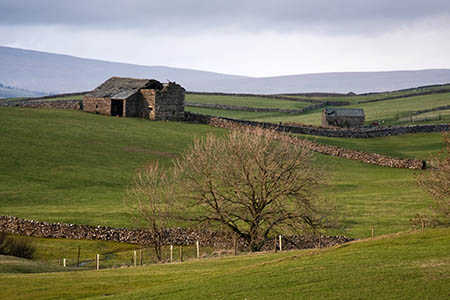National park leaders have welcomed a coalition Government decision not to allow disused barns to be converted to houses.
Areas of outstanding national beauty and national parks will not now be included areas where planning permission should be given to convert agricultural buildings to homes.
Authorities had raised concerns about the ‘suburbanisation’ of rural areas if a swathe of barns in remote areas was turned into dwellings.
Planning minister Nick Boles made the announcement yesterday in a written statement. The Conservative minister said sensitive landscape areas would be excluded from the relaxation in planning rules for agricultural buildings.
However, he added: “We expect national parks and other local planning authorities to take a positive and proactive approach to sustainable development, balancing the protection of the landscape with the social and economic wellbeing of the area.
“National parks and other protected areas are living communities whose young people and families need access to housing if their communities are to grow and prosper.”
The change of heart was welcomed by the Campaign for National Parks. Its chief executive Julian Woolford said: “We’re delighted that the planning minister has listened to the arguments we made and has decided to exempt national parks and areas of outstanding natural beauty from these proposals.
“This demonstrates that the Government is standing by their commitments to protect national parks and has recognised the importance of treating these special areas differently under planning policy.
“We recognise that national parks are living, working landscapes and fully support the appropriate change of use of old buildings. Today’s announcement means that national park authorities can continue to ensure this happens in a managed way through the existing planning system.”
The CNP said a number of Conservative MPs had also called for national parks to be exempt, including former national parks minister Richard Benyon.
The news was also welcomed by the Yorkshire Dales authority. There are an estimated 6,000 barns in its area.
Peter Charlesworth, chairman of the Yorkshire Dales National Park Authority, said: “We are delighted that the Government has listened to the concerns of England’s national parks and others and has modified its proposals accordingly, allowing national parks to retain local planning control.
“We’re now going to be getting on with implementing the spirit of the national planning policy framework, to promote sustainable development in the Yorkshire Dales national park.
“This will, no doubt, include the conversion of some barns to houses, but only where they’re in suitable locations.
“We know local people support that approach and our new local plan, which maps out the authority’s policies for planning issues from 2015 to 2030, contains proposals to bring more derelict farm buildings back into use.
“A draft of the local plan is due to go out to consultation in May and, if the policies regarding barns are approved, we will then be able to continue with our commitment to conserve the special qualities of the barns and walls landscape, making better use of one of the National Park’s best assets.”
Jon Avison, chairman designate of the Yorkshire Dales Society, said: “We are over the moon that the collaborative work of the society and the national park authority has helped to persuade the minister to change his mind on this very important policy.
“It would have had a potentially devastating impact on the landscape and the character of the Yorkshire Dales.”
Mr Boles’s announcement was also welcomed further south in the Peak District.
Lesley Roberts, who chairs the Peak District National Park Authority’s planning committee, said: “I’m very pleased that national parks, the green lungs of this country, will be protected from the creeping suburbanisation that this move would have brought.
“Traditional farm buildings are an integral part of our landscape and heritage which we were set up to safeguard, and which bring huge benefits for tourism and local jobs.
“It’s not that we oppose the re-use of redundant farm buildings – we have through the current planning system approved many conversions to houses and business units where appropriate and sustainable.
“I’m pleased we’ll be able to continue to consider these on a case-by-case basis, and the doors have not been opened to uncontrolled development in national parks.”
Peak District national park chief executive Jim Dixon added: “We are delighted that Nick Boles listened to the strength of the argument we made from the national parks and has reflected our special role in guiding good development in the landscape.
“We are keen to work with farmers and landowners to seek positive opportunities to help develop the rural economy.”
